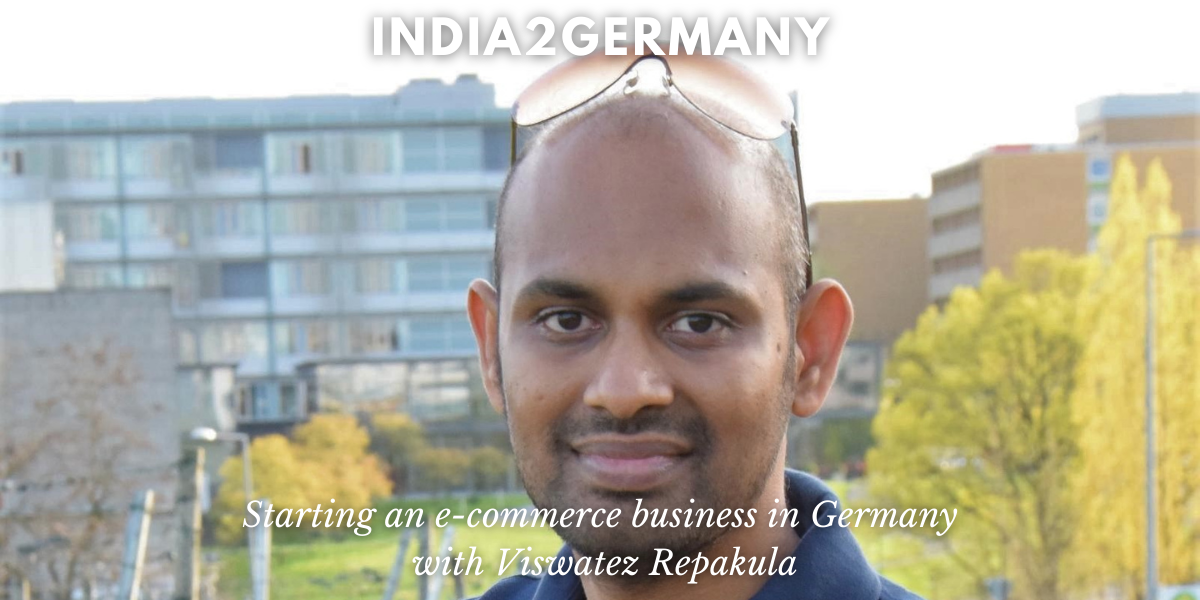
Top 10 reasons why Indians leave Germany!
Living abroad comes with opportunities, as well as challenges. Every week we share wonderful opportunities that Germany offers to expats like us. However, this time, Viswatez reflects on his time so far in Germany and why he thinks many of his friends from India decided to go back home.
This is a guest post by Viswatez Repakula, who is originally from India and living in Stuttgart, Germany.
This year, I completed 18 years of stay in Germany and that’s almost half my life. Just looking back at all these years and thinking about the upcoming near future, gathering all the experiences and thoughts of myself and my friends till date, I have experienced many friends leaving Germany year after year citing different reasons, at different stages of their lives. We were about 28 Indians in our college here, but only 2 are left in Germany. That means nearly 90% people left. I tried to categorize and prioritise the reasons which I experienced all these years. Hope some of the readers can resonate with the emotions depicted here!
Getting rich quick
Many of us moved abroad for a single reason: “in search of better life and opportunities”, for ourselves, as well as for our families who stayed back home. Many of the problems we face back home are always solved by earning more money. If we had enough money, we could have either avoided a ton of problems or solved them using money. This is the primary motivation of earning money. The challenge is earning it quickly so that we would be able to support parents and as well as kids at the same point of time. What are our options? Climb up the ladder in the corporate job or establish a business on our own. Neither of them is easy in Germany. Getting rich quick is near to impossible. As people work very loyally to a single company their whole life, it’s hard to move up the ladder. The “ease of doing business” covers only the bureaucratic part and doesn’t cover the financial part. As both options have their own challenges and people tend to settle down with age and get into comfort zone, it becomes extremely difficult to earn more and more money quickly. So, we always have enough money to support our family here, but we will always fall short of money, when we need to support someone back home. The basic question which then arises is “Was the effort worth it?”
Language as a barrier (career)
Many of my college friends and seniors saw language as a barrier to their career growth in Germany. Their point was “If I can put the same amount of hard work in some other English-speaking country, I would rise much quicker, without the need of additional effort in learning the language and culture”. True. So, if we are extremely fluent in German, will it create better opportunities? Yes. It does. How far can we go? Is it unlimited? No. There are limits to the growth, even if one is extremely fluent. There comes a point of stagnation where in someone else will be preferred over us, citing insane reasons, which we can’t even imagine or think of. Fluency in German will however let you understand the cultural aspects and thinking of public which in turn will help us, especially if we decide to establish a business on our own.
German bureaucracy and lack of interest in digitalisation/modernisation
Imagine if our Govt. wants to modernise any of our railway stations or airports and make it state of the art. How would we react? We would be extremely happy about it. We would be taking pictures, circulating them in social media and waiting for them to open. How about in Germany? Not really! We have seen the struggles faced by Berlin Airport, Stuttgart central railway station, Tesla Factory and Frankfurt airport closing traffic past midnight and wonder how it can happen. This repulsion from the public is shocking for us and we absolutely cannot resonate with the local public emotions. This stays as a barrier to be connected to the country emotionally.
Digitalisation in everyday life is in a baby stage in Germany, whereas in other countries, it’s already a matured adult. Half of the German banks introduced “real-time transaction” this year, whereas back at home, people are paying street vendors using QR codes. The fear of technology and adaption is real and every time someone brings this topic, hours of discussions will go by, but nothing really materialises. People can walk out of a Bank in India with a working account, Debit card and an online PIN within couple of hours, whereas in Germany it will take weeks before we can even have a functioning bank account. These things will give a backward country impression for many of us.
Rigidness and lack of flexibility
When my colleagues and friends suggested me to register my unborn child for a place in the Kindergarten, I thought they were joking and going overboard. But it is true. If we don’t register so early, there is hardly any chance of getting a place. What happens if we get a better job somewhere else? We will end up thinking twice, as it is not easy to move between places. This kind of situation is unique to few European countries and is not faced by our people in other nations. This is regarded as inflexibility in life, which is forcing us to compromise. After a while we will even stop trying, as moving really creates more problems than the profits it can bring. Every single move in life, either career or personal, is tightly coupled to location in Germany. This will start irritating after a while, especially for ambitious people.
Inability to afford huge houses
The childhood dream of many of us is to live in a bigger house, which can accommodate our kids and parents happily. This can be realised in many parts of USA, where the real-estate is dead cheap. This constantly haunts the Indians in Germany, as it is very difficult in Germany. We either must move far away from the city to escape the real-estate prices, where there is no social life or struggle with the smaller size apartments in the city. It’s a choice. To get something, we must leave something.
Lack of household help, exactly when needed
New parents would appreciate some household help, especially in the early days of their parenting. Our parents are also ready to help. But how friendly are the policies to make it realistic? Not much! Even in such circumstances, the 90-day visit rule applies. Sometimes we hear some exceptions here or there, but it is not a mainstream solution. There are other workaround solutions like parental leave, but they make more sense only if we are financially well-off. With the maximum cap of 1800€ per month, it wouldn’t make any ends meet, especially with a new-born at home, where the expenses are going high. So, people tend not to utilise it, because it is not rewarding at all.
Language as a barrier (personal, kids)
It is an altogether different ball game, when the foreign language starts to enter the personal family life, through kids. No matter how fluent our kids are in our native mother tongue, they won’t be able to express everything in our mother tongue, as they are not exposed to such expressive situations. Kids will fall back to German in this case, to express themselves and the parents are dumbstruck at this point. The bonding between parents and kids shall start to fall into a certain jeopardized category, which is very hard to explain in words. The love towards kids might oversee this issue to a certain extent but cannot deny the issue. For many people, this was a make-or-break situation till date. Even if one crosses this issue, the next one shall arise when the kids start learning subjects like Maths and Science in German. No matter how fluent we are, teaching those subjects in German is something which is out of scope, and we remain with the feeling of being illiterate.
Money lacks power
Many of the young parents struggle to get a place at a kindergarten for their kids. Even if one gets it, there is no guarantee that it is a full day place. So, what’s the criteria to decide who gets the place first? Every person who is in a socially difficult situation has a higher priority than a traditional family. Instead of increasing the places to make everyone fit, the solutions look to prioritize the existing group of people. The traditional families face lot of difficulty, as they are the last priority in this case. Can we make our situation improve by spending more money? No! Money doesn’t work for this situation, as even private Kitas are full and have a long waiting list. This is just an example. There are numerous situations in Germany, where-in money doesn’t help us in solving our problems. It feels bad that despite earning well, we can do nothing about them. This will hit hard when one is facing the situation. In many other countries, people won’t face these situations and even if they face, they can just pay more money or change the Kita for their betterment with ease.
Upbringing
How we raise our kids is quite different from how it is done in Germany. But kids are constantly exposed to other kids and adults outside our home and are bombarded with conflicts every day. I am sure we all have experienced enough kids in the park, where they won’t share any kind of toys or equipment with our kids. This is culturally perfectly acceptable for some people, as they see it as their “kid’s decision”, which we should respect. For us, it will generate lot of conflict as we teach our kids to share things, even if it is for a little while. As and when our kids get older, they will start questioning our ethos and values back, like “Why should I share it with them? They didn’t share it with us the last time”. This cultural conflict is already heavy on adults itself, imagine what the kids will go through. As these kinds of conflicts are playing a part in a child’s character, parents tend to think twice on staying back.
Inability to help parents and invite them to Germany for longer stays!
This has been the topmost reason I have heard among friends and acquaintances, who went back home or left Germany for any other country. Getting parents to stay more than 90 days at a stretch is a real headache in most of the EU. The policies consider wife and kids as a part of family, but not parents. It is an indigestible fact for most of us, how stupid and cold-hearted, the rules can be. The amount of decision-making conflict our generation goes through as in either to support kids for their future or help parents in their old age is unimaginable. Many of our friends who live in other countries or back at home, might not face this issue, but for us, who live here, this problem is a real deal-breaker.
Don't get me wrong, I still feel Germany is a wonderful place to live. I call it home and this entire blog is dedicated to the opportunities that the country presents to expats like us. I just want to show you the other side of the coin!
If you get to hear any other reasons from your friends or you would like to share it with us, do let me know!
Also read our previous conversation with Viswatez:

Interested in contributing to our website? 📧 Drop us a line at hello@india2germany.com
India2Germany Newsletter
Join the newsletter to receive the latest updates in your inbox.







